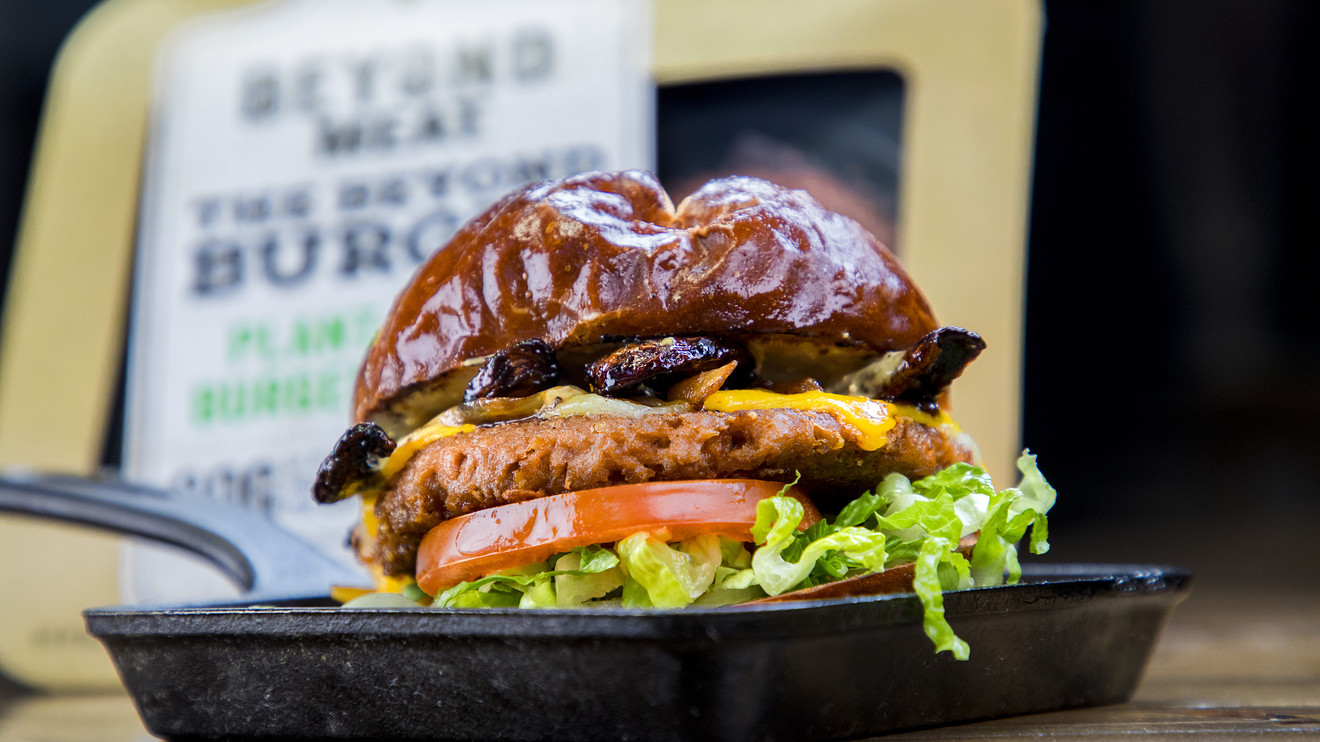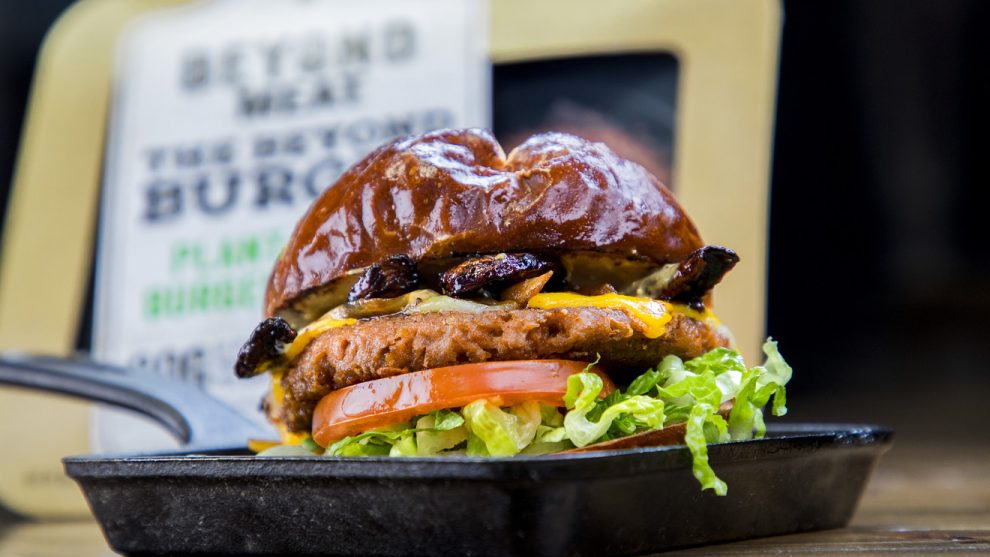
Wait — this is it?
This is the world’s most expensive sandwich? This is the $5 billion-plus miracle that has people on Wall Street fainting with ecstasy?
Are you kidding me?
I’m sitting in a restaurant in South Boston biting into a “Beyond Burger” — the vegetarian “but it tastes like meat” phenomenon that is sending Beyond Meat’s BYND, +6.90% stock into orbit.
And … huh?
It tastes to me like a dry, rubbery patty. The flavor? Meh.
Is it like “meat”? Well, kinda. Sorta. Maybe. It tastes a bit like those cheap, frozen hamburgers we used to get at high school.
I prefer the “veggie patty” at Subway. Sorry.
I was so disappointed I immediately called an Uber UBER, +4.14% and zoomed across town to a more upscale restaurant to see if I liked their Beyond Burger any better.
I didn’t.
“We used to have an awesome falafel burger!” the waitress told me, sadly.
I was so baffled, I went over to Whole Foods and bought a “fresh” Beyond Burger and grilled it at home. I couldn’t even finish it. Not even covered in ketchup. I had to air out my home.
Tastes like …
OK, I’ve been a vegetarian for about five years. Maybe I’ve forgotten what meat tastes like. Maybe I’d have the same reaction to a real hamburger. But I’d be surprised. I didn’t quit meat because of the taste. And back when I was an omnivore, I used to love red meat and burgers. And I mean real burgers — ground steak, seared on both sides, and served rare. I used to adore rare steak, too.
But this Beyond Burger didn’t take me back.
Some of my vegetarian friends insist they really like Beyond Burgers. And they are apparently not alone.
Beyond Meat’s stock has nearly quadrupled since pricing its shares at $25 on May 1, jumping another $6 to $92.92 on Thursday. The El Segundo, Calif.-based company is now valued at a remarkable $5.55 billion.
That’s about 60 times last year’s sales.
It’s a heckuva lot to pay for a sandwich.
Over the years I’ve had more veggie burgers — good, bad and indifferent — than I could possibly count. They come in all kinds. And there’s nothing scarce about them. Everyone can make their own, and many do.
There is no more carnivorous dish on this planet than Scottish haggis — if you don’t believe me, Google the ingredients — but at this point, almost every restaurant in Edinburgh serves their own vegetarian version. And many locals swear vegetarian haggis is even better than the original. If you can make a vegetarian haggis, you can make a vegetarian anything.
Yes, some veggie burgers are better than others. Who knew?
“Oh, you don’t understand,” my friends said. “These aren’t just veggie burgers! They taste just like meat!”
Well, OK. I’m obviously not a key demographic for this, because I don’t pine for vegetarian food that tastes like meat. But as far as I could tell, Beyond Burgers didn’t really taste much like meat anyway.
‘Pea protein isolate’
The packages for Beyond Burgers list “pea protein isolate,” “cellulose from bamboo,” methylcellulose, maltodextrin, vegetable glycerin, modified food starch and various other ingredients including “beet juice extract” for color.
Beyond Meat’s research-and-development budget: $21 million over the past three years. The company employs 63 people in R&D.
Look, I wish the people at Beyond Meat well. I really do. I think the meat industry is bad for the environment and for our health. If this thing will woo people away from hamburgers, that’s great. And I wish its chief competitor, the Impossible Burger, the best too. (TV’s Jim Cramer is a big fan.)
And maybe I’m a weird outlier. Beyond Meat must be doing something right. Last year sales rose 170% to $88 million. They just signed a deal to sell their Beyond Sausage through Canadian fast-food chain Tim Hortons. (Hortons’ parent company, Restaurant Brands International QSR, +1.54% plans to sell Impossible Burgers through its Burger King chain.)
Beyond Meat’s stock is hot, and the momentum is amazing. All power to them.
But I’m just not getting it.
Proprietary … recipe
Economics is about supply and demand. Even if the demand for vegetarian foods is booming, and even if you like Beyond Burgers, what is going to limit supply and give you pricing power?
The prospectus says the company has so far been issued just one — yep — U.S. patent. It has another 21 pending here and overseas. Meanwhile, it also relies on “unpatented proprietary expertise, recipes and formulations and other trade secrets and copyright protection to develop and maintain our competitive position.” We’re talking recipes.
The foods are made with “Canadian and European yellow peas, mung beans, sunflowers, rice, canola oil and coconut oil.”
Did they corner the market in European yellow peas? Do they have a secret “mung bean” monopoly?
You can get these things anywhere.
Agricultural sources say mung beans are trading for about $2 a kilo wholesale these days. The price is down 6% in a year. At these levels, Beyond Meat, the company, is valued at about the same as 2 1/2 million tons of mung beans.
Total worldwide production? Oh, about 2 1/2 million tons.
Price and value
In these heady days on Wall Street, $5.55 billion isn’t seen as a lot of money for a company. And maybe it really isn’t. The current price would be, say, a reasonable 20 times earnings if Beyond Meat gets to the point where it generates $275 million in net income. Of course, at the moment it generates no net income — it is still losing money — but sales are growing fast. Gross margins are 20% … for now.
Meanwhile, at $5.55 billion the company would be a tiny snack for a giant food conglomerate that wanted to jump on the vegetarian bandwagon.
So I have no idea what this stock is really worth. But it’s fascinating to see what the insiders thought the stock was worth just a short while ago.
Last November, while agreeing on executive compensation, the board estimated “fair value” for the stock at no more than $17 a share. Exactly a year ago they put it at a mere $3.
Today, apparently, it’s worth almost $93? Fast work.
Brett Arends is a MarketWatch columnist.












